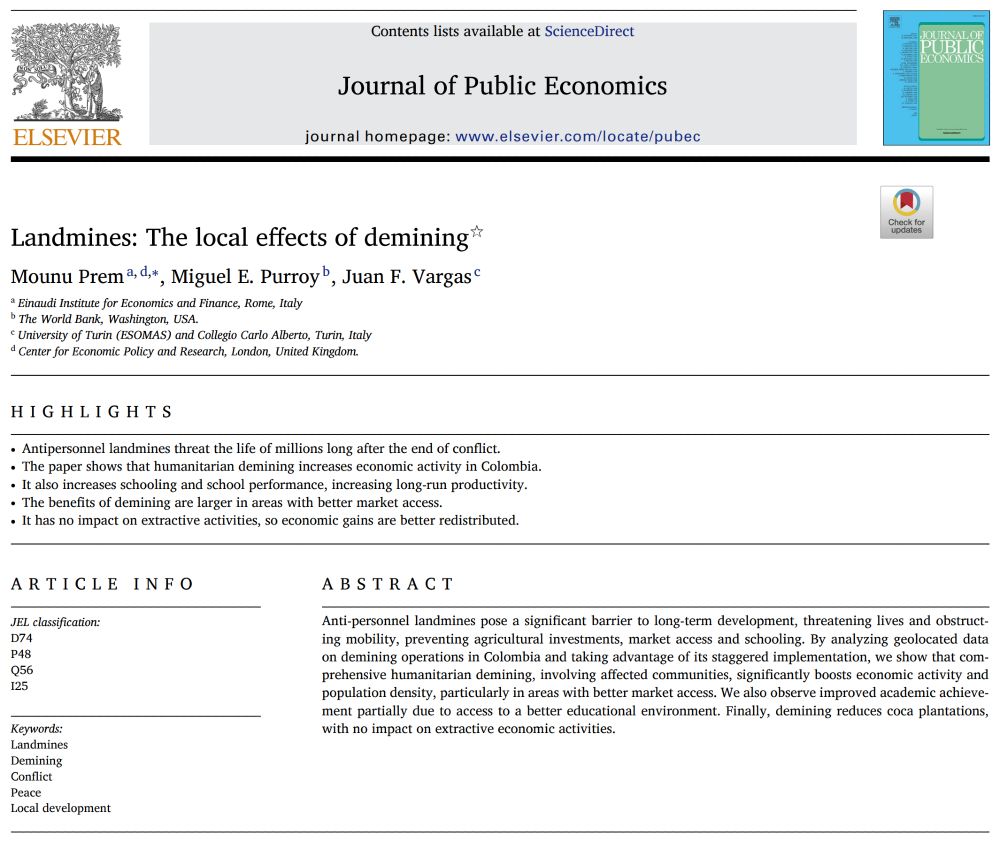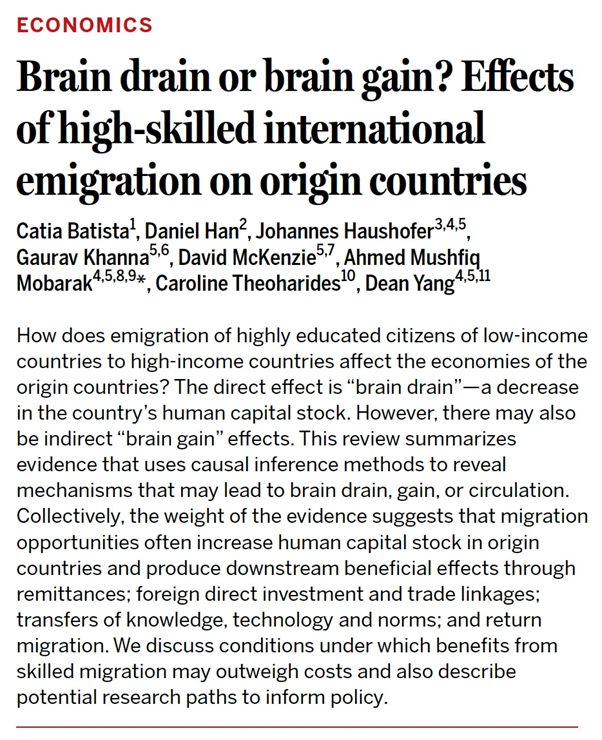🌍 With ~60 countries still contaminated by landmines, our findings from Colombia offer a roadmap. Demining is more than removing hidden explosives—it’s unlocking human and economic potential.
📄 Full paper at @jpube.bsky.social: doi.org/10.1016/j.jpub…
🧠 Policy implications:
Demining is expensive, but it pays for itself many times over!
📌 Target demining near roads and schools
📌 Pair demining with development (e.g. crop substitution)
📌 Frame demining as a long-term investment, not just post-conflict cleanup 👇🏽
⚖️ Demining also reduces inequality.
Redistributed gains benefit the broader community—not just elites. This underscores its value not just as a safety measure, but as a powerful and inclusive development policy. 👇🏽
🌳 Any unintended consequences?
No! We found no increase in deforestation or illegal gold mining—meaning that economic gains weren’t captured by extractive or illegal industries. And with complementary crop substitution programs, coca cultivation fell even further. 👇🏽
🛣️ Which areas benefit more?
Connectivity matters. Areas with better road access see stronger gains.
We simulate the national economic impact using a general equilibrium model: Without demining, Colombia’s GDP would’ve been 0.7% lower per year (2013–2019). 👇🏽
📚 Education improves immediately after demining:
•Schools reopen
•Enrollment surges
•Student-teacher ratios fall
•More students advance grades
It’s like giving children an extra year of school—just by clearing the ground they walk on. 👇🏽

💥 Key findings:
✅ Nightlights (a proxy for economic activity) ↑ 11.5% ➡️ municipal GDP ↑ 0.7% ➡️ $1 spent on demining yields ~$6 in benefits.
✅ Population density ↑ 2.6%
✅ Math test pass rate ↑ 6.2 p.p.
✅ Reading test pass rate ↑ 7.5 p.p.
✅ Coca cultivation ↓ 9.9%
💡Methodology:
We used geolocated data on 294 demined areas and compared them to regions not yet demined (but eventually would be). Using modern DiD methods (e.g. Callaway & @pedrosantanna.bsky.social 2021), we identified the causal effects of demining on local development. 👇🏽
Context: Colombia has one of the highest numbers of landmine victims globally—top 3 for homemade mines. But in 2013, amid peace talks with FARC, Colombia began a large-scale humanitarian demining campaign. We analyzed its impact. 👇🏽
🚫💣 Landmines silently continue to threaten lives long after conflicts end. But what happens when we remove them? In the paper, we study the economic and social effects of humanitarian demining in Colombia 🇨🇴. The results are, I think, quite powerful.
👇
So happy to see this paper finally published. And so cool that it found a home at @jpube.bsky.social !
This is paper summarizes what is perhaps the most policy relevant piece of research I’ve conducted so far. A 🧵:
Reposted by: Juan F. Vargas, Samuel Bentolila, Luis A. Puch
nadaesgratis.es/santiago-san...

Reposted by: Juan F. Vargas
Today on VoxDev, Oliver Vanden Eynde (@pse.bsky.social) & @jvargas.bsky.social (Collegio Carlo Alberto) discuss how extreme weather and the green transition are reshaping global conflict: voxdev.org/topic/energy...

Reposted by: Juan F. Vargas, Gerard Llobet
No. A temporary plateau was inevitable given the heterogeneity of social media users. From my point of view Bluesky is already over the hump 1/
Reposted by: Juan F. Vargas
Reposted by: Juan F. Vargas
Reposted by: Juan F. Vargas
www.phdpareto.carloalberto.org

Reposted by: Juan F. Vargas, Robert Metcalfe
"Landmines: The local effects of demining"
By Mouno Prem, Miguel E. Purroy, & @jvargas.bsky.social
www.sciencedirect.com/science/arti...
#econsky

“Brain drain” or “brain gain”?
Effects of high-skilled international emigration on origin countries
doi.org/10.1126/scie...


by Shelly Lundberg — Reposted by: Juan F. Vargas, Colin Mitchell

t.co/prKTktWwyl
Reposted by: Juan F. Vargas
This recent talk by Nobel laureate David Card at @rfberlin.bsky.social, on Immigration and Minimum Wages, is magisterial.

CAF-Development Bank of Latin America released this call for proposals to develop policy documents on organized crime in LAC:
t.co/Rs0JYvjApm
@jenniferdoleac.bsky.social
by Daron Acemoglu — Reposted by: Juan F. Vargas
